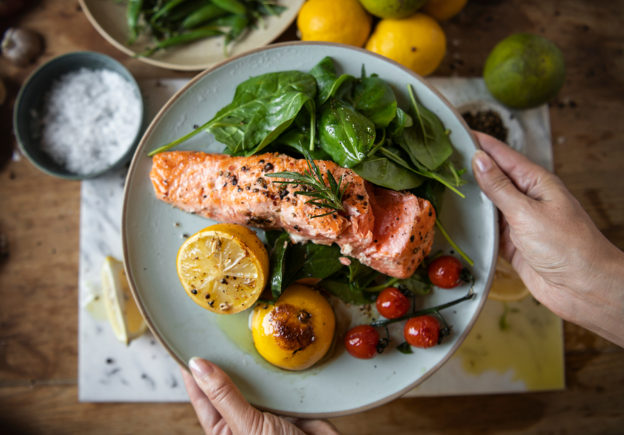By David Blyweiss, M.D., Advanced Natural Wellness
June 14, 2019
Seafood is one of those foods that most people want to eat more of… but be cautious.
One of the biggest concerns my patients have is that, while they know the omega-3 fatty acids in wild caught fish are good for them, they worry about mercury levels. So they tend to avoid it. Or they eat farm raised fish that have higher levels of inflammatory fatty acids and added antibiotics.
Others recognize the benefits of seafood, but can’t quite accept the odor and flavor or mouth feel of it.
But there are plenty of folks tell me they love seafood. The only reason that they don’t eat more of it is because they often make the “wrong” decision when…
- Given a choice between a delicious grilled salmon or perfectly seared steak
- Choosing between scallops and braised short ribs
- Picking pan-seared Atlantic mackerel over prime rib
- Deciding on a grilled fish sandwich or a hamburger
- Selecting between fish tacos or traditional ones
I understand the conflict.
As a kid, there wasn’t a lot of fish served in my house. We were more of a “meat and potatoes” kind of family. So I know how hard it is to break those early life habits.
But here’s the deal.
MD Exposes the Hidden Danger to Your Eyes

When your eyesight starts to fail, it's a real problem. Suddenly you can't go to the grocery store... you can't get to the doctor if you have an emergency... you can't meet your friends for dinner…
Your "regular" doctor doesn't have time to keep up with the latest research. And the same goes for eye doctors. They go to school to learn how to fit you for glasses and contacts, but have no way of preventing the damage and loss of eyesight that threatens your freedom and independence.
Let me show you something that explains a LOT about how your eyes work.
In my FREE Special Report, I'll show you a HUGE, untapped resource for your eyes that safely and naturally restores clear, effortless eyesight.
Click here to get started...
You can gain substantial health benefits by replacing red meat with seafood products.
At the top of the list is better cardiovascular health. When you choose fatty fish over red meat, it can reduce your risk of death from coronary heart disease by leaps and bounds.
And it doesn’t take a lot of seafood to produce these wonderful results. Replacing red meat with just about 12 ounces of fish each week can add many healthy years to your life – and your heart.
Plus, the omega-3 fats in seafood help to reduce brain shrinkage, strengthen neuron communication and increase blood flow to the brain. They even lower blood levels of beta-amyloid, a hallmark of Alzheimer’s disease.
If that’s not enough to get you excited, check this out.
Omega-3 fatty acids work at a biological level to protect and lengthen your telomeres. And that’s no easy feat!
Your telomeres are the time-keepers of all your biological processes.
You see, as you age your cells divide. And with each division, your telomeres become shorter. When your telomeres become too short, your cells can’t divide anymore. They just die.
Ultimately, the more quickly your telomeres shorten, the faster you age. This makes it very important to feed them the fuel they need to flourish.
Omega-3s also help you live a longer and healthier life by boosting mitochondrial function and gene expression that protect against disease.
The World's Quickest Solution for Ending Prostate and Urinary Misery
This has recently been revealed to be one of the only real breakthroughs in prostate health.
The seeds of a strange fruit (sometimes called "Chinese Apples") hold powerful phytonutrients that are a revolution in prostate health.
In fact, UCLA and Veterans Administration research have now proved this to be true.
Not only that, but it may be the worlds quickest solution for ending prostate misery.
Simply stated, these phytonutrients represent a huge step beyond beta sitosterol, saw palmetto, and other phytosterols alone.
Simply click HERE if you want to have fast prostate relief...restful, uninterrupted sleep...no more constant "urges to go"...enhanced virility...and optimal prostate support for life.
These are all great reasons to choose fish over red meat several times a week. And you can even do it without worrying about how much mercury you’re getting.
How to Eat All the Fish You Want
Without Worrying about Mercury
While it’s true the fish is one of the most common food sources of mercury, that doesn’t mean you can’t be strategic about it.
I always recommend avoiding fish with the highest mercury content. Fish that fall into the “high” and “highest categories include bluefish, grouper, halibut, mackerel (Gulf, Spanish and king,) ocean perch, Chilean sea bass, tuna, marlin, shark, orange roughy and swordfish.
But that still leaves you plenty of others to choose from. In particular, wild-caught fish that are low on the food chain contain the least amount of mercury.
Sardines and herring are about as low as you can go. Alaskan salmon, trout and flounder also make the list. Clams, oysters, shrimp and scallops fall into this category too. Not lobster though, sorry.
Stick with these as much as you can. But if you occasionally want to enjoy fish with a slightly higher (moderate) mercury profile – like snapper, cod, freshwater perch or mahi mahi – it’s okay. Just don’t go overboard. Keep your intake at once a week or less.
And here’s a little trick that all seafood lovers should know about.
Darker fleshed fish generally have a higher fat content than lighter colored fish. So they contain higher levels of omega-3 fatty acids.
This means salmon, sardines, anchovies, and trout will have a better omega-3 profile than, say, flounder or perch.
I also have another tip for you.
Fattier fish tends to be more “full-flavored”. They’re usually going to taste and smell “fishier”.
So if the smell or odor of fish puts you off, there is nothing wrong with selecting a lighter colored fish. Sure. The omega-3 content will be a little lower. But there will still be plenty of it. (I find that many of my seafood challenged patients quickly discover that they actually like these milder seafood options.)
Mix things up. Experiment with grilling, poaching, broiling, steaming and baking. Add herbs, spices and marinades.
And next time you have a choice between a dish that contains red meat and one that includes fish… choose the fish!
SOURCES:
A substantial benefit from replacing steak with fish. Press Release. Technical University of Denmark via Eurekalert. May 2019.
Hosomi R, et al. Seafood Consumption and Components for Health. Glob J Health Sci. 2012 May; 4(3): 72–86.
Pottala JV, et al. Higher RBC EPA + DHA corresponds with larger total brain and hippocampal volumes: WHIMS-MRI study. Neurology. 2014 Feb 4;82(5):435-42.
Fernando Gómez-Pinilla. Brain foods: the effects of nutrients on brain function. Nat Rev Neurosci. Jul 2008; 9(7): 568–578.
Kiecolt-Glaser JK, et al. Omega-3 fatty acids, oxidative stress, and leukocyte telomere length: A randomized controlled trial. Brain Behav Immun. 2012 Sep 23. pii: S0889-1591(12)00431-X.







